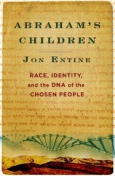BKMT READING GUIDES
Abraham's Children: Race, Identity, and the DNA of the Chosen People
by Jon Entine
Hardcover : 432 pages
0 club reading this now
0 members have read this book
Introduction
Could our sense of who we are really turn on a sliver of DNA? In our multiethnic world, questions of individual identity are becoming increasingly unclear. Now in ABRAHAM'S CHILDREN bestselling author Jon Entine vividly brings to life the profound human implications of the Age of Genetics while illuminating one of today's most controversial topics: the connection between genetics and who we are, and specifically the question "Who is a Jew?"
Entine weaves a fascinating narrative, using breakthroughs in genetic genealogy to reconstruct the Jewish biblical tradition of the chosen people and the hereditary Israelite priestly caste of Cohanim. Synagogues in the mountains of
As people from across the world discover their Israelite roots, their riveting stories unveil exciting new approaches to defining one's identity. Not least, Entine addresses possible connections between DNA and Jewish intelligence and the controversial notion that Jews are a "race apart." ABRAHAM'S CHILDREN is a compelling reinterpretation of biblical history and a challenging and exciting illustration of the promise and power of genetic research.
Excerpt
CHAPTER 2IDENTITY COMPLEX
Let us remember all of our Jewish brothers and sisters, who through their faithfulness to One God, inspired all Christians.”
Resplendent in a red and white robe on this Palm Sunday Eve, Father William Sánchez solemnly marks what he calls the “Passover of Jesus,” the journey of the king of the Jews that begins with his entry into Jerusalem. ...
Discussion Questions
No discussion questions at this time.Notes From the Author to the Bookclub
What made you want to write this book? What was the idea that sparked your imagination? I’ve always been curious about my own family trace lost in the fog of 19th century Eastern Europe. My genealogical research ended in missing records and erased grave stones. Did my Dad’s family really originate in the Middle East? Was my mom descended from Esther or a convert from the Ukraine? DNA provided a way to unravel my personal history, but also my religious and ethnic roots back to the time of the Bible. My family was also unfortunate to be victimized by a genetic disease—a mutant gene that causes breast cancer—that indelibly marks my ethnicity as a Jew. Who is a Jew? These two questions, which had weighed on me for years, spurred me to write ABRAHAM’S CHILDREN. What do you want readers to take away with them after reading the book? We have spent decades in the grip of a multiculturalist ethic that tries to blur our ethnic and religious roots. Yet we yearn for the clarity that comes with knowing where we are from and where are parents were from. The acknowledgement of identifiable human races and ethnic groups, including Jews, is not an endorsement of simplistic racist stereotyping. Our collective challenge is what we do with these nuanced notions of race and racial and ethnic stereotypes that are emerging from a more sophisticated reading of the human genome. DNA is at once an atlas and time machine that can transport us to biblical times and beyond. The Israelite ancestry of Muslims, Christians, and Jews is now open to all of us. Genetic anthropology has awakened us to the shared roots of civilization and the promise of designer therapies to target disease. We are on the verge of expanding this tracking process beyond our male and female lineages to the entire human genome, which will give us a far more complete picture of the ethnic threads woven by God or nature to create each of us. But the thorny reality is that if all of us were alike, the entire Human Genome Project would be fruitless. Our DNA tells contrasting stories: the crude map revealed in 2000 suggests that we are individuals with a shared past, while a magnified look at our genes made possible by more recent research finds patterns of small but meaningful population differences––in some cases, racial differences, to use the popular, if imprecise and socially unacceptable term. While we often posture that we are all the same, human differences provide each of us, and our families and extended communities, rootedness in the world. The challenge is to harmonize these competing narratives of unity and separation. The great paradox of human biodiversity research is that the only way to understand how similar humans are is to learn how we differ. And thank God for that.Book Club Recommendations
Recommended to book clubs by 0 of 0 members.
Book Club HQ to over 90,000+ book clubs and ready to welcome yours.
Get free weekly updates on top club picks, book giveaways, author events and more








